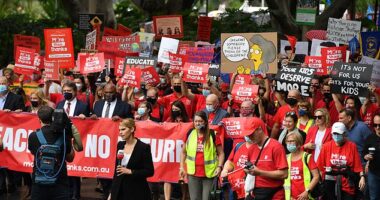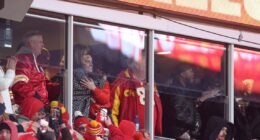Australian home borrowers have been dealt a severe blow just before Christmas with the Reserve Bank denying them a rate cut.
1
Governor Michele Bullock gave a strong hint rate cuts could be months away with inflation still too high, ahead of an election next year.
‘The board remains resolute in its determination to return inflation to target and will do what is necessary to achieve that outcome,’ the Reserve Bank said.
The word ‘inflation’ had 22 mentions in the RBA’s monetary policy decision statement.
The RBA left the cash rate on hold at its last board meeting for 2024 but stressed the underlying inflation rate of 3.5 per cent was still too high and well above its 2 to 3 per cent target.
‘While headline inflation has declined substantially and will remain lower for a time, underlying inflation is more indicative of inflation momentum, and it remains too high,’ it said.
Headline inflation is at a three-low low of 2.8 per cent but the RBA is expecting it to surge to 3.7 per cent in late 2025 after the federal government’s $300 electricity rebates expire mid-year.
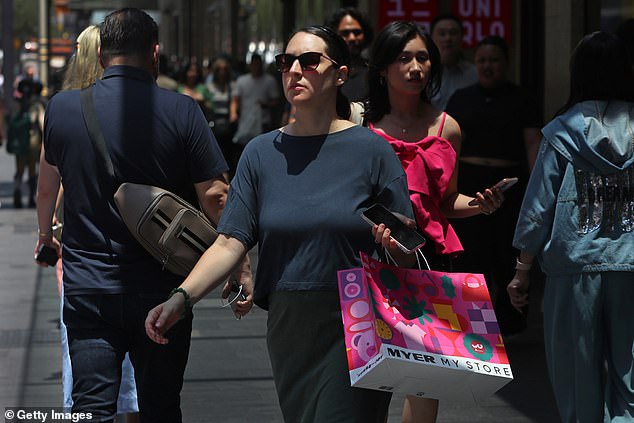
Australian home borrowers have been dealt a severe blow just before Christmas with the Reserve Bank denying them a rate cut (pictured is a Sydney shopper)
Relief from the RBA’s 13 increases in 2022 and 2023 is also being delayed despite Australia’s economy growing by just 0.8 per cent in the year to September - the slowest growth since the 1991 recession outside of a pandemic.
Westpac, NAB and ANZ don’t see a rate cut occurring until May next year, when an election must be held.
But the volatile futures market is now pricing in three rate cuts in 2025 which would it back to 3.6 per cent for the first time since May 2023.
The RBA has this month removed the phrase ‘not ruling anything in or out’ - in a sign another rate rise was now off the table as inflation continues to moderate.
‘The board is gaining some confidence that inflation is moving sustainably towards target,’ it said.
‘While the level of aggregate demand still appears to be above the economy’s supply capacity, that gap continues to close.’
Ms Bullock told reporters this change in language was ‘deliberate’ to acknowledge a softening in economic activity.
‘The board wanted to give the message that they have noticed some of the data that is a bit softer,’ she said.
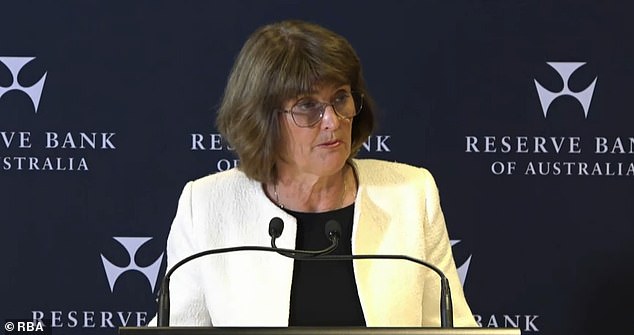
Governor Michele Bullock gave a strong hint rate cuts could be months away with inflation still too high, ahead of an election next year
‘The board wanted to convey that their opinion and their views are evolving and they’re evolving as the data evolves.
‘We’re not saying we’ve won the battle against inflation yet but we’re saying we’ve got a little bit more confidence that things are evolving as we think in our forecasts.’
Vanguard senior economist Grant Feng, however, said the RBA was still concerned about weak productivity adding to inflationary pressures, as businesses passed on higher wholesale costs on to consumers.
‘Although sluggish productivity growth is not a new challenge for the Australian economy, the sharp fall is particularly worrisome for the inflation outlook,’ he said.
Mr Feng said more government spending leading up to next year’s election could also add to inflation.
‘Given spending commitments in the federal budget, and the upcoming federal election in 2025, fiscal policy is expected to play an increasingly prominent role in supporting economic and employment growth,’ he said.
‘This adds complexity to the inflation outlook, as fiscal expansion counters the restrictive effects of monetary policy.’
Ms Bullock said Treasurer Jim Chalmers and other government ministers were aware of this.
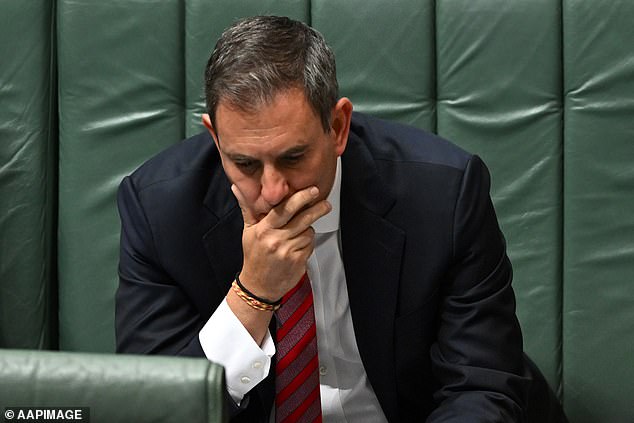
Ms Bullock said Treasurer Jim Chalmers (pictured) and other government ministers were aware of the link between government spending and inflation
‘I do think they are conscious of the inflation implications and that’s why they’ve tried to approach things like rebates in the way they’ve done,’ she said.
The Reserve Bank noted global uncertainty could fuel global inflationary pressures, with Donald Trump taking over as American president on January 20 with a plan to impose broad 10 to 20 per cent import tariffs on goods coming into the United States.
‘There remains a high level of uncertainty about the outlook abroad,’ it said.
‘Geopolitical uncertainties remain pronounced.’
Ms Bullock said the RBA’s forecasts would be dependent on President Trump sticking to his campaign promises, or using tariffs as a trade negotiation tool.
‘It depends very much on whether he does what he says he will do and that actually is a bit of an unknown,’ she said.
‘Then it depends on how other countries react to that sort of thing.’
But the RBA chief said 60 per cent tariffs on China from the U.S. would affect Australia.
‘If there are moves that really impact growth in China, and if growth in China is affected, that impacts their demand for exports from us and that impacts our economy,’ she said.
The Bank of Canada has this year cut rates four times, taking its policy rate down to 3.75 per cent or 60 basis below Australia’s equivalent of 4.35 per cent.
The Reserve Bank of New Zealand has cut rates three times to 4.25 per cent, moving as recently as November.
The RBA noted it was keeping rates on hold as other central banks like the U.S., UK and European Union provided relief.
‘Most central banks have eased monetary policy as they become more confident that inflation is moving sustainably back towards their respective targets,’ it said.
‘They note, however, that they are removing only some restrictiveness and remain alert to risks in both directions, namely weaker labour markets and stronger inflation.’
The RBA isn’t meeting again until February 17 and 18 under changes that will see it meet eight times a year instead of 11 previously.
Treasurer Jim Chalmers will retain his power to overrule the independent Reserve Bank board, as part of a political deal with the Greens to keep a veto that has never been used since the RBA was created in 1959.

